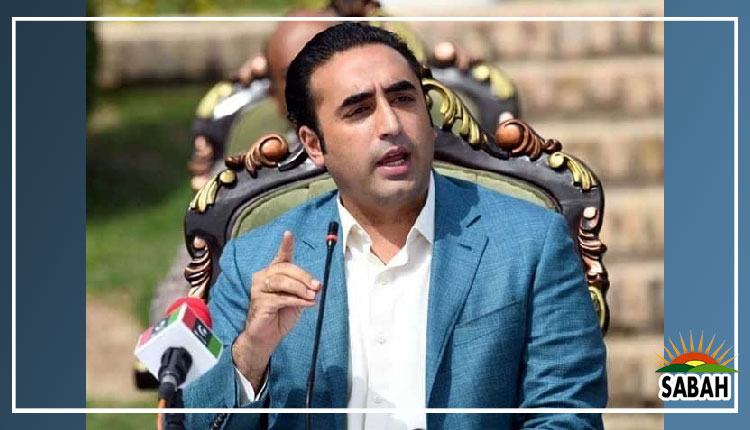FM Bilawal urges int’l community to enhance capacity of govs & their relevant institutions to detect, analyze & expose disinformation
ISLAMABAD, June 23 (SABAH): Foreign Minister Bilawal Bhutto Zardari has called for enhancing public awareness about disinformation to build societal resistance and resilience against it.
Bilawal Bhutto Zardari was addressing a meeting of the Group of Friends to Counter Disinformation for the Promotion and Protection of Human Rights and Fundamental Freedoms virtually on Thursday.
The Foreign Minister urged the international community to enhance the capacity of the governments and their relevant institutions to detect, analyze and expose disinformation. He said United Nations and its agencies should help build the capacity of member states especially the developing countries.
Bilawal Bhutto Zardari said financial and technical support should be extended to national and international researchers, and institutions which are involved in detecting disinformation. He said the UN Department of Information can play a critical role in this regard.
The Foreign Minister stressed that concrete international efforts can help expose and dismantle disinformation networks.
He called for a concerted efforts through cooperation to minimize the negative impacts of disinformation on human rights and relations between community and states.
The Foreign Minister suggested that UN Human rights mechanism should highlight the negative impact of disinformation.
He urged the UN to develop rules, standards and regulations for adherence by the private sector, social media companies and other non-governmental actors.
Bilawal Bhutto Zardari said UN can develop a compendium of “best practices” and guidelines for actions, including through the use of advanced technologies, such as Artificial Intelligence , to serve as guidelines for National and international action.
He said the UN Secretary-General should create an inter-Agency Task Force on Disinformation and appoint a Focal Point, for regular and on-going interactions with Member States, the private media and on-line companies and other stakeholders.
He said exponential proliferation of disinformation, especially through on-line platforms and social media, has spread social discord; fostered hate speech, racism, discrimination, xenophobia, Islamophobia.
Bilawal Bhutto said that on behalf of Pakistan, I would like to suggest the following actions:
First, we should enhance public awareness about disinformation through information campaigns promoted by Member States and the United Nations and build societal resistance and resilience against disinformation.
Second, we should enhance the capacity of governments and their relevant institutions to detect, analyze and expose disinformation and disinformation campaigns and networks. To this end, the UN and its agencies should help to build the capacity of Member States, especially the developing countries, to analyze, fact-check and filter information, especially on-line information. Moreover, financial and technical support should be extended to national and international researchers and institutions which are involved in detecting disinformation. The UN Department of Information can play a critical role in this context.
Such a concerted international effort can help to expose and dismantle disinformation networks – some of which have been operating against my country for over 30 years.
Third, we should make a concerted effort, through cooperation, to minimize the negative impact of disinformation on human rights and relations between communities and States, by building firewalls against false information, ensuring transparency, adhering to human rights principles, such as respect for personal privacy and reputation, preventing the propagation of racism, discrimination and hate speech. The UN can develop a compendium of “best practices” and guidelines for actions, including through the use of advanced technologies, such as Artificial Intelligence (AI), to serve as guidelines for National and international action.
Fourth, the UN’s human rights mechanisms should highlight the negative impact of disinformation on the enjoyment of human rights and, for their part, also exercise due diligence in the use of unsubstantiated or questionable information in evaluating human rights situations.
Fifth, the UN should develop rules, standards and regulations for adherence by the private sector, social media companies and other non-governmental actors. Such standards must also enforce transparency rules on the media and social platforms.
Sixth, to discharge its extensive role and responsibilities, the UN Secretary-General should create an inter-Agency Task Force on Disinformation and appoint a Focal Point, for regular and on-going interactions with Member States, the private media and on-line companies and other stakeholders.
Finally, the UN, perhaps through its Committee on Information, should open a comprehensive dialogue, led by Member States, and with the participation of the private sector, business enterprises, media and social media platforms and civil society stakeholders, to develop a coherent consensus on international cooperation to combat disinformation.












